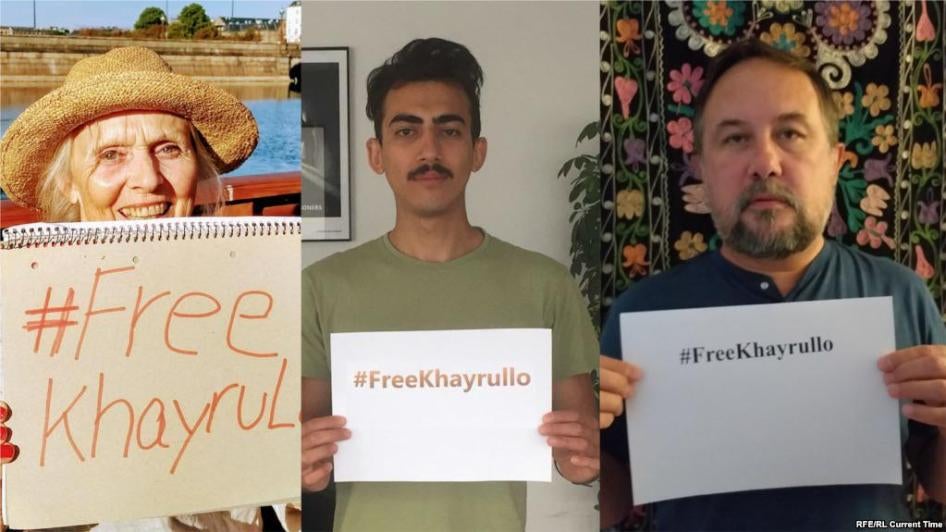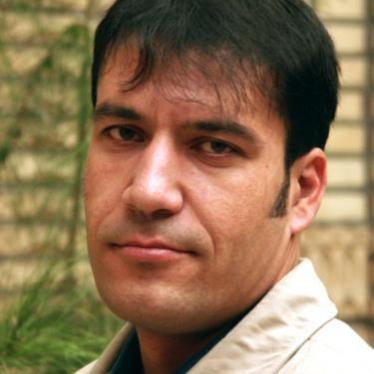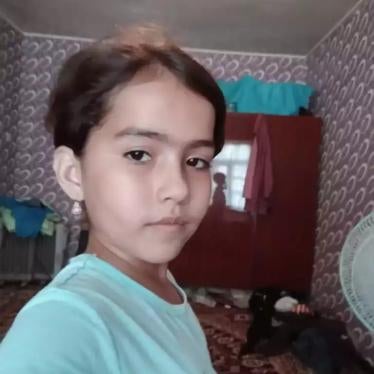The ban came just three days after Tajik authorities relented and allowed 4-year-old Ibrohim Hamza Tillozoda to leave the country so he could receive treatment abroad for testicular cancer.
Human rights organizations like HRW and the Norwegian Helsinki Committee issued statements and appeals for much of July while Ibrohim's mother, Mizhgona, tried to get her son out of Tajikistan as his tumor doubled in size in less than a month.
Ibrohim's grandfather is Muhiddin Kabiri, the chairman of the now banned Islamic Renaissance Party of Tajikistan (IRPT). The party was part of a coalition that fought the Tajik government during the 1992-97 civil war. The June 1997 peace deal gave the IRPT government positions, and the IRPT stuck to the terms of the peace deal.
But President Rahmon was intent on neutralizing all opposition, including the IRPT. The party was able to field candidates in Tajikistan's March 2015 parliamentary elections but banned as a party and declared a terrorist organization by the end of October. All of its senior leaders who stayed in the country were sentenced to lengthy prison terms in 2016, including two who were sentenced to life in prison.
This summer's travel bans on Fatima, her grandmother, and the Kabiri family were the culmination of years of persecution by authorities that began at the same time as the crackdown on the opposition.
A flashpoint for the abuse of activists' relatives in Tajikistan occurred in September 2016, one day after representatives of Group 24 and the IRPT made presentations at the annual OSCE Human Dimension Implementation Meeting in Warsaw, Poland.
HRW said at the time that "in the city of Kulob at the family home of Shabnam Hudoidodova...a crowd of students, teachers, school directors from various schools, city officials, and members of the local TV station gathered in her 9-year-old daughter's (Fatima's) classroom.... The crowd taunted her, calling her the daughter of a 'terrorist' and 'enemy of the people,' and followed her home, where she lives with her grandmother and other relatives."
Returning the next day, HRW said, "demonstrators attacked Hudoidodova's 10-year-old niece, hitting and kicking her, apparently mistaking her for Shabnam's daughter." People then broke into the house "beating at least three relatives who attempted to keep them out, shouting that the relatives were 'terrorists.'"
Mob violence targeting dissidents' relatives also occurred in at least three other locations that day, potentially indicating a level of coordination that could point to government orchestration.
In addition to violence, reports suggest the authorities have forced relatives to make videos denouncing their activist family members. In December 2015, when Kabiri was scheduled to speak publicly in Washington at an event organized by Freedom House, "authorities came to the home of Kabiri's 95-year-old father and detained him with seven other family members," forcing them to record a video condemning their relative that the authorities then put on YouTube. The same tactic has been used on the relatives of Group 24 activists.
In January 2016, authorities prevented Kabiri's father, Tillo, by then 96, from boarding a plane to Istanbul, where he had planned to receive medical treatment. As with Fatima Davlatova, security services forced him off the plane after he had already cleared passport control. He died in October 2016.
One might have thought Tajik authorities would continue such abuses with impunity or become immune to the negative press. But in a dramatic reversal, following an international outcry by rights groups and scrappy social-media campaigns to #FreeHamza and #FreeFatima, Tajikistan finally bowed to the pressure. On August 2, Kabiri's 4-year old grandson and his mother departed for Istanbul. August 11 was the next breakthrough, when Fatima and her grandmother were allowed to leave as well.
The success of #FreeHamza and #FreeFatima suggest that even in the toughest cases, pressure sometimes works.
Activists are hoping that a combination of public and private pressure will lead to a dismissal of charges or eventual release for Mirsaidov, and perhaps an improvement in Tajikistan's rights record. And they have some reason to feel a consensus is slowly building in their favor. In May, two UN bodies issued rulings declaring that the imprisonment of two other prominent political prisoners, opposition figures Zayd Saidov and Mahmadali Hayit, violates international law. Additional rulings on other political prisoners are almost sure to follow suit.
Stronger support for human rights in Tajikistan by international actors is urgently needed. They can start by lending their support to #FreeKhayrullo and similar campaigns, showing that Tajikistan's practice of using relatives as bargaining chips and silencing critics needs to end now.









